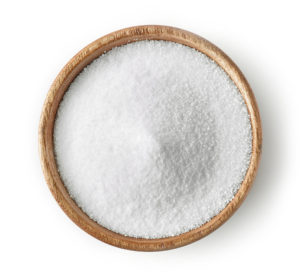
wooden bowl of salt isolated on white background, top view
It’s quite possible that no seasoning gets a worse rap than salt. But why? Is it really that much of a risk to your health?
I actually feel a bit bad for salt. It gets blamed for high blood pressure and heart attacks and has been vilified for years. What’s scary is that some people blindly accept this and have no idea why.
Salt has zero calories. It does not promote the formation of LDL plaques along arterial walls. Too much salt is associated with higher blood pressure and an increased risk of a heart attack. But what you often don’t here is that salt, in and of itself, is not of much concern.
In fact, if you’re cooking at home or adding it at the table for some extra seasoning, it’s actually good for you. That’s right, the dangers of salt are entirely dose-dependent.
Your body needs salt (or sodium). Sodium is needed for nerve impulses, muscle relaxation and contraction, and proper hydration. Iodine added to table salt even helped correct a hypothyroid epidemic right here in America.
The problem with salt is not adding it to your eggs or tomatoes at the breakfast table. On the contrary, too much salt is a symptom of a diet high in ultra-processed foods.
Ultra-processed foods catch a bad rap for all the right reasons. They have little-to-no nutrition, are high in saturated fats and sugar, and are one of the primary causes of the obesity epidemic, type-2 diabetes, heart disease, and more.
But the salt content of these foods does not get its fair share of attention. Salt is loaded into these items even when they don’t taste particularly salty. Take white bread, for example. The stuff tastes rather sweet, right? Two large slices have nearly 300 mg of sodium. Prepared soups and other meals are teeming with salt, as well.
If you’re eating a meal or two per day at a restaurant, you can count on even more. It’s loaded into your favorite sauces, meals, meats, and more. If it comes in a package or from a fast-food restaurant, you can almost bet it’s loaded with salt.
This is very different than adding salt to a homemade bowl of soup or a sandwich. That seasoning is actually good for you. Salt, when added at the table, can in no way harm your health (unless it’s a store-bought meal or you’re eating processed foods the rest of the day).
If you’ve got high blood pressure or have a high stroke or heart attack risk, cutting processed food intake is essential. This can help reduce the pressure of too much sodium.
For those of you with healthy blood pressure and a diet low in processed food, don’t worry about adding salt to food and recipes. You actually need it.